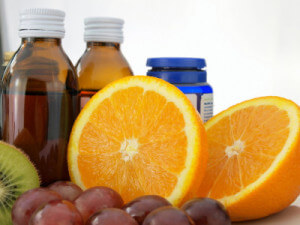Be Aware of Food/Drug Interactions
 For some of us, an increase in the use of prescription drugs might be a rite of passage as we age. For others who live with a chronic illness, taking several prescription drugs daily is routine. In any circumstance, patients should be knowledgeable about their own medication’s possible side effects, as well as how each drug interacts not only with other medications but also with foods and beverages.
For some of us, an increase in the use of prescription drugs might be a rite of passage as we age. For others who live with a chronic illness, taking several prescription drugs daily is routine. In any circumstance, patients should be knowledgeable about their own medication’s possible side effects, as well as how each drug interacts not only with other medications but also with foods and beverages.
For example, the liver makes proteins with the help of Vitamin K, which form blood clots. Warfarin, commonly known by the brand name Coumadin, is a blood thinner prescribed to block the effects of Vitamin K, thus making it more difficult for blood to clot. Vitamin K can be found in vegetables, fruits, dairy products, beverages, meats and fish, and fats and oils. Because warfarin and Vitamin K work against each other, what you eat could impact warfarin’s effect. Foods containing high amounts of Vitamin K include broccoli, Brussels sprouts, cabbage, mayonnaise and canola oil. It is not necessary to avoid foods with Vitamin K, but rather to keep your diet consistent. A sharp increase or decrease in Vitamin K may require your medication to be modified. Typically, patients taking warfarin have their blood tested periodically to measure clotting time, and dosages may be adjusted accordingly.
Statins, drugs that lower blood cholesterol levels, block the action of a chemical in the liver that is essential for making cholesterol. Eating grapefruit or drinking grapefruit juice can interfere with the statin drugs Zocor (simvastatin), Mevacor (lovastatin), and Lipitor (atorvastatin). Grapefruit or grapefruit juice…as little as one glass or one grapefruit, can interfere with enzymes in the stomach, which in turn prevent them from breaking down these statins. This causes a high accumulation of the drug in your body and could cause liver or muscle damage. Patients taking a statin usually have their blood tested after six weeks and then annually or more frequently to monitor for potential liver or muscle damage.
The class of antibiotics known as tetracyclines is commonly prescribed for treatment of some infections. Drinking or eating dairy products, such as milk or cheese, or taking calcium pills or iron supplements, can interfere with most “cycline” drugs’ effectiveness. These medications are absorbed mainly in the stomach and can bind with calcium, which slows their absorption into the bloodstream. For optimum effectiveness, patients are advised to take cycline medication about one hour before or two hours after consuming calcium rich foods.
There are frequently warnings on prescriptions that say, “avoid alcoholic beverages while taking this medication.” Just how dangerous is having a drink when our prescription bottle warns us otherwise? Amy Peak, PharmD, Director of Drug Information Services for the College of Pharmacy and Health Services at Butler University, says that, “A glass of wine at dinner when you are taking a pain medication might cause you to become groggy more quickly. Drinking a glass of wine and then driving even a short distance home while groggy impairs your ability to react, and that’s a problem.”
Caffeinated drinks like coffee, tea and soda when mixed with some medications, including oral contraceptives or certain antibiotics, can alter how caffeine is metabolized. This causes higher concentrations of this stimulant in the body, resulting in an increased impact of caffeine’s effects (shaky hands, rapid heart rate and inability to sleep). If you are taking medication for high blood pressure and drink a lot of coffee, the combination can inhibit the drug’s effectiveness.
When any new medication is prescribed, be clear on dosage, side effects and any possible interactions. Prescription drugs are accompanied by a “Personal Prescription Information” flyer that delineates side effects and interactions beyond what is indicated on the container.
The post Food/Drug Interaction Awareness appeared first on Specialdocs.
